Medvedev Says Sanctions Are Inevitable
Even as China joined other major powers to demand a "serious response" from Tehran, Beijing said, putting pressure upon Iran was not an effective way to persuade the country to halt its nuclear programme, even as China joined other major powers to demand a "serious response" from Tehran.

The five permanent members of the U.N. Security Council, and Germany, told Iran on Wednesday to prepare a "serious response" by October 1 to demands it halt its nuclear program, or risk the consequences.
The ultimatum came after U.S. President Barack Obama made his first speech to the U.N. General Assembly, urging leaders to join him in confronting world issues including Iran's nuclear plans.
In the meantime, Iran’s government is developing detonators capable of setting off a nuclear bomb, an Iranian resistance group said.
The detonators, which use conventional explosives and are designed to ignite the uranium payload of a nuclear weapon, are being developed as prototypes at a secret site called Metfaz in a military zone about 30 kilometers (19 miles) east of Tehran, the National Council of Resistance of Iran said today. The research center for the project is in Pars in eastern Tehran.
“To build a bomb they need both to complete this system, and they are not far, and have enough highly enriched uranium,” said Mehdi Abrishamchi, a member of the council, at a Paris press conference. The uranium that Iran has managed to enrich so far is too weak for a weapon, he said. Iran may be six months away from producing adequately enriched uranium, he said.
It was also reported, Foreign Ministry spokeswoman Jiang Yu called on all sides to "redouble diplomatic efforts" to persuade Iran to end its nuclear programme.
Her remarks came after Russia indicated it could soften its longstanding opposition to further sanctions.
Iran's nuclear ambitions are set to lead Thursday's nuclear proliferation debate at the UN General Assembly.
Tehran says its nuclear programme is for civilian use only but many Western states believe it is seeking to develop nuclear weapons,
Subscribe to Pravda.Ru Telegram channel, Facebook, RSS!


